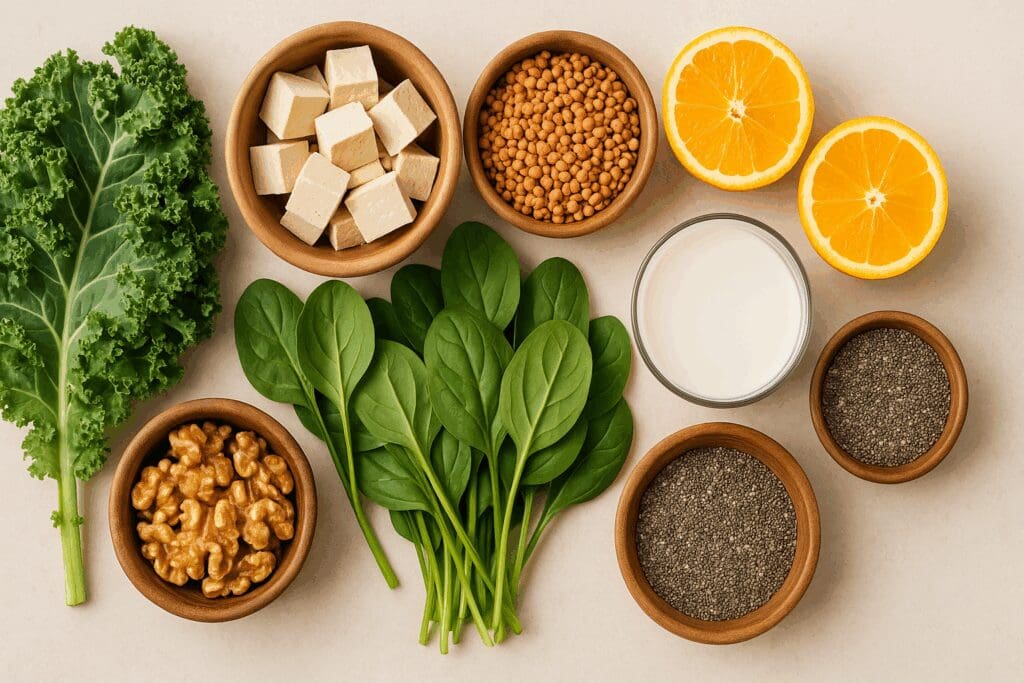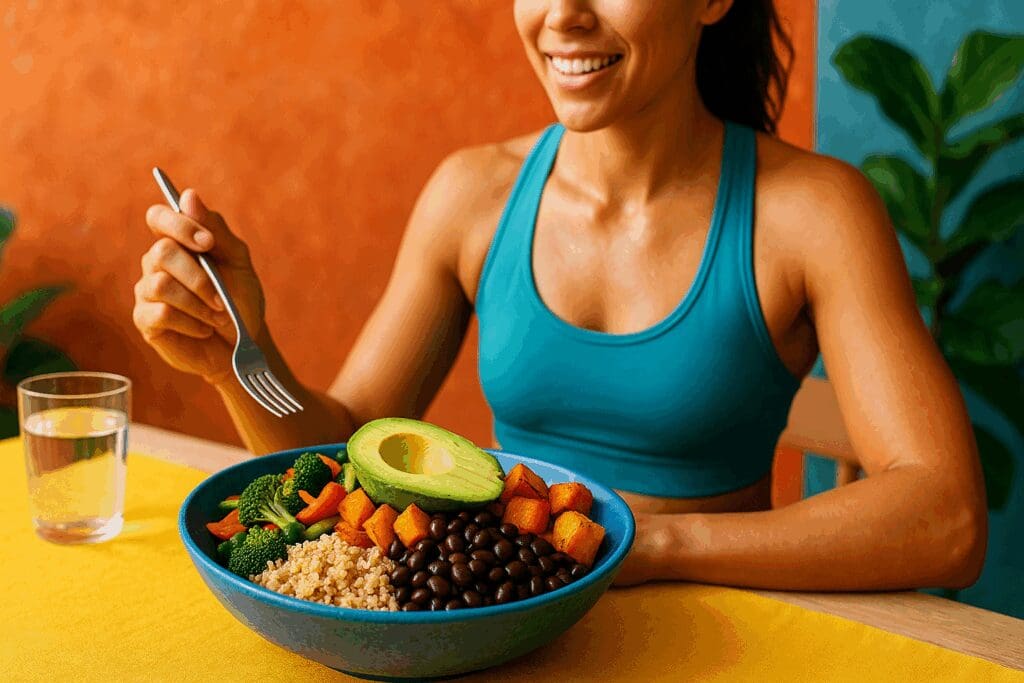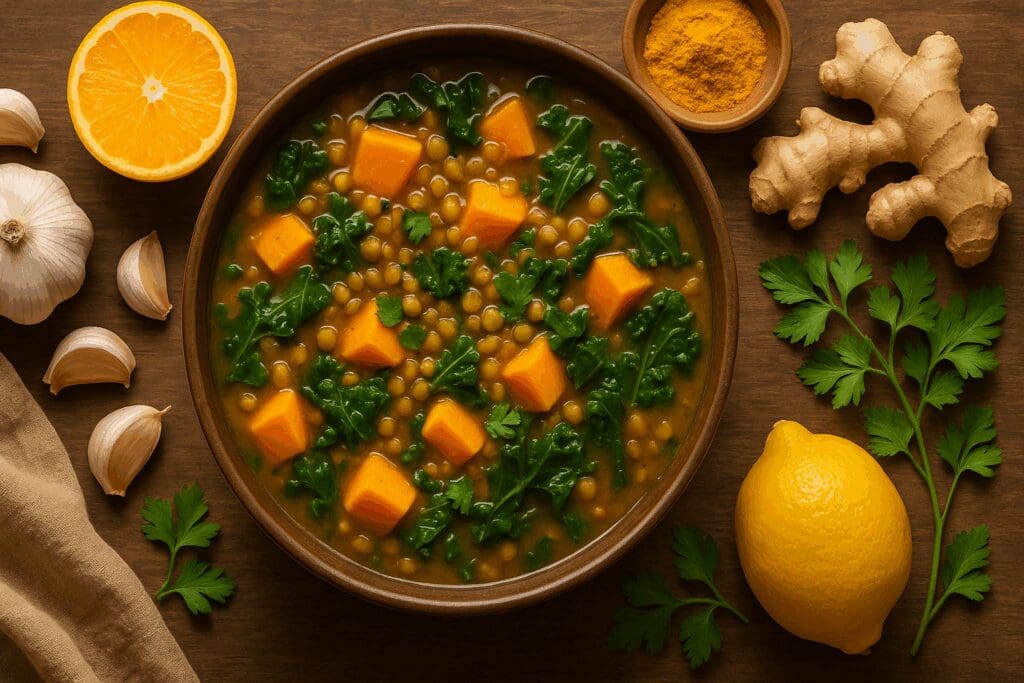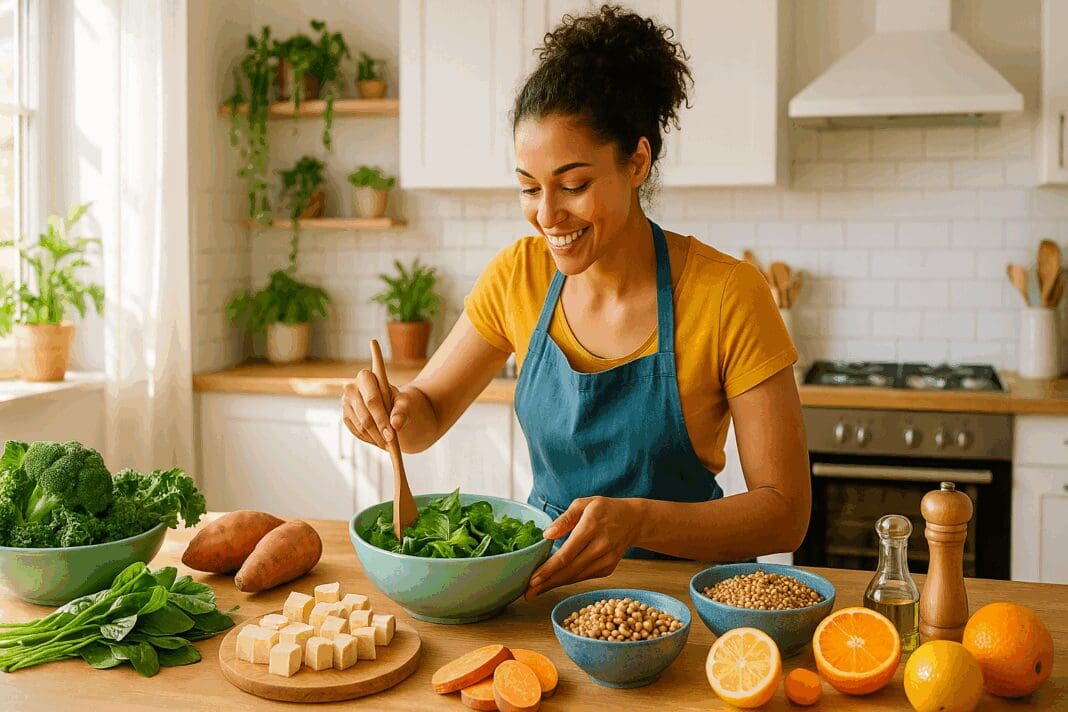The pursuit of optimal health and sustained energy is a cornerstone of modern women’s wellness, and diet remains at the heart of this journey. For many women, choosing vegan main meals is more than a dietary preference—it is a deliberate commitment to nurturing their bodies with wholesome, plant-derived nourishment. These meals can be nutrient-dense, balanced, and remarkably satisfying when approached with intentionality. From hormonal health to bone integrity and cardiovascular wellness, the impact of plant-based eating on women’s health is extensive and well-documented in scientific literature. This article explores the most expert-recommended vegan main meals, offering evidence-based guidance, culinary inspiration, and nutritional strategies to fuel the modern woman’s active, demanding lifestyle.
You may also like: The Ultimate High Fiber Diet Meal Plan for Sustainable Energy and Gut Health

Understanding Nutritional Needs of Women on a Plant-Based Diet
Women’s nutritional requirements fluctuate across life stages, with specific demands during menstruation, pregnancy, lactation, and menopause. On a plant-based diet, ensuring adequate intake of key nutrients such as iron, calcium, vitamin B12, omega-3 fatty acids, and protein becomes essential. For instance, iron, which supports red blood cell formation, is particularly crucial for menstruating women, yet plant-based iron (non-heme) is less bioavailable than animal-based forms. Combining iron-rich plant foods like lentils, tofu, and spinach with vitamin C sources such as citrus fruits or bell peppers can significantly enhance absorption.
Protein, a fundamental building block of muscle and tissue repair, is easily met with a diverse range of plant sources including quinoa, tempeh, beans, and seitan. Contrary to common misconceptions, vegan main meals can deliver complete proteins when thoughtfully composed. Calcium and vitamin D are central to bone health, especially during menopause when the risk of osteoporosis rises. Fortified plant milks, leafy greens, and sun exposure contribute to meeting these needs. Omega-3s, crucial for heart and brain health, are accessible through flaxseeds, chia seeds, walnuts, and algae-derived supplements. A well-rounded plant-based approach, supported by expert guidance, ensures that women can thrive nutritionally while enjoying a diverse and flavorful culinary repertoire.
Why Vegan Main Meals Are a Powerful Ally for Women’s Wellness
Vegan main meals are inherently rich in dietary fiber, antioxidants, phytonutrients, and complex carbohydrates—elements that support satiety, digestion, and hormonal equilibrium. High-fiber diets have been shown to stabilize blood glucose levels, reduce inflammation, and improve cholesterol profiles, all of which are particularly relevant for women navigating polycystic ovarian syndrome (PCOS), premenstrual syndrome (PMS), or menopause.
Moreover, the abundance of plant compounds such as isoflavones in soy and lignans in flaxseeds can positively influence estrogen metabolism. This has implications for hormonal regulation and may reduce the risk of hormone-related cancers such as breast and ovarian cancer. The anti-inflammatory nature of whole plant foods also supports immune function and skin health, helping women combat oxidative stress, a key contributor to aging.
Adopting vegan main meals as part of a consistent dietary pattern can also contribute to sustainable weight management. Because these meals are generally lower in calorie density and higher in fiber, they promote fullness without excess energy intake. This aligns well with the needs of women seeking to maintain energy levels while managing weight for health, fitness, or fertility goals. Integrating the best plant based meals into daily routines thus becomes a practical and empowering strategy for holistic health.

Vegan Main Meals That Optimize Energy and Endurance
One of the most frequently cited concerns among active women on a plant-based diet is maintaining energy levels throughout the day, especially during physically demanding tasks or athletic training. Vegan main meals can be expertly designed to meet these needs through strategic nutrient timing and macronutrient balance. Carbohydrates are the body’s preferred energy source, and complex, slow-digesting carbs like sweet potatoes, whole grains, and legumes provide sustained energy release without the crashes associated with refined sugars.
Pairing these carbs with adequate protein and healthy fats enhances satiety and metabolic function. Meals like a quinoa and black bean bowl with avocado and roasted vegetables exemplify this synergy. Such meals support glycogen replenishment, muscle repair, and cognitive stamina. Additionally, B vitamins, found in abundance in whole grains and legumes, are vital co-factors in energy production pathways. Including a diversity of plant based diet recipes ensures a broader spectrum of micronutrients, reducing the risk of fatigue and enhancing endurance.

Easy and Nourishing Vegan Main Meals for Busy Lifestyles
Modern women often juggle multiple roles, leaving little time for elaborate meal prep. Fortunately, easy plant based meals can be both time-efficient and deeply nourishing. A chickpea and spinach coconut curry, prepared in under 30 minutes, delivers protein, iron, and anti-inflammatory compounds. Similarly, sheet pan dinners with marinated tofu, sweet potatoes, and Brussels sprouts provide a hands-off approach to cooking while ensuring nutrient density.
Meal prepping staples such as brown rice, roasted vegetables, and lentil dal enables rapid assembly of balanced bowls throughout the week. Overnight oats made with chia seeds and plant milk can double as breakfast or a light dinner. These convenient options underscore the practicality of integrating plant based meal ideas into everyday life. Accessibility and simplicity are key to consistency, and easy plant based recipes offer solutions that align with real-world demands.

Vegan Main Meals That Support Hormonal Balance and Reproductive Health
Hormonal health is a multifaceted domain influenced by dietary patterns, stress levels, physical activity, and environmental exposures. Vegan main meals that incorporate phytoestrogens, anti-inflammatory nutrients, and hormone-supportive minerals can positively influence this delicate system. Soy-based foods like tempeh and edamame are rich in isoflavones that may modulate estrogen activity, offering benefits for both PMS relief and menopause symptom management.
Magnesium and zinc, found in legumes, seeds, and whole grains, are involved in hormone synthesis and regulation. Healthy fats, particularly omega-3s, support the production of sex hormones and reduce menstrual pain. Meals such as a warm lentil and quinoa salad with tahini dressing not only satisfy taste preferences but also deliver these essential nutrients. Including whole food plant based meals regularly creates a foundation for hormonal harmony and reproductive vitality.
Plant Based Dinner Recipes to Enhance Sleep and Recovery
Sleep and recovery are often overlooked pillars of wellness, yet they play a critical role in hormonal balance, immune function, and mental clarity. Certain vegan main meals, especially when consumed at dinner, can support restful sleep and overnight tissue repair. Complex carbohydrates stimulate the release of tryptophan, a precursor to serotonin and melatonin. A comforting bowl of brown rice with sautéed kale, chickpeas, and sesame seeds can promote relaxation while delivering magnesium and protein.
Additionally, tart cherry juice, walnuts, and pumpkin seeds contain natural melatonin and magnesium, making them ideal evening additions. Avoiding heavy, greasy foods at night also reduces the risk of indigestion and sleep disruption. Women can create a plant based diet dinner routine that nourishes the body while signaling it to wind down, promoting deeper and more restorative sleep cycles. Incorporating plant based dinner recipes for beginners ensures simplicity and success even for those new to this lifestyle.
Creative Vegan Main Meals for Digestive Wellness
Digestive health is foundational to overall well-being, influencing nutrient absorption, immunity, and even mental health through the gut-brain axis. Vegan main meals centered on fiber-rich vegetables, fermented foods, and prebiotic ingredients enhance gut microbiota diversity and function. A tempeh and sauerkraut stir-fry served over buckwheat noodles exemplifies a gut-friendly dish that is both flavorful and beneficial.
Insoluble fiber from leafy greens and soluble fiber from oats and legumes work together to promote regularity and prevent constipation. Meanwhile, polyphenols in berries, herbs, and spices support the growth of beneficial bacteria. Fermented plant foods like miso, kimchi, and pickled vegetables contribute natural probiotics that aid digestion. For women struggling with bloating or irritable bowel symptoms, cooked vegetables and low-FODMAP meals may offer relief. Adapting plant based diet ideas to individual digestive needs ensures comfort and consistent nutrient uptake.

Whole Food Plant Based Recipes That Boost Immunity and Vitality
The immune system is a complex network influenced by nutrient status, sleep, stress, and overall dietary habits. Whole food plant based recipes that incorporate a rainbow of colorful vegetables, legumes, nuts, seeds, and whole grains supply the antioxidants, vitamins, and minerals necessary for immune resilience. Vitamin C-rich produce such as bell peppers, broccoli, and citrus fruits fortify the body’s defense systems.
Zinc from pumpkin seeds and selenium from Brazil nuts support white blood cell activity and pathogen resistance. Turmeric, ginger, garlic, and oregano are potent anti-inflammatory and antimicrobial agents that elevate the healing potential of meals. A warming red lentil and vegetable stew seasoned with these spices is both soothing and immune-enhancing. For busy women, batch-cooked soups, stews, and chili are excellent ways to maintain a steady intake of healthy plant based recipes throughout the week.
Plant Based Meal Recipes That Support Mental Focus and Cognitive Health
Cognitive performance is closely linked to dietary patterns, with plant-based diets showing potential for preserving brain function and reducing the risk of neurodegenerative conditions. Vegan main meals that prioritize omega-3 fatty acids, antioxidants, and complex carbs can enhance memory, mood, and mental clarity. A chia seed pudding with walnuts, blueberries, and cinnamon makes an excellent breakfast that primes the brain for the day ahead.
Lunches composed of leafy greens, beets, lentils, and whole grains provide nitrates and B vitamins that support cerebral blood flow and neurotransmitter synthesis. Evening meals such as roasted cauliflower and tahini bowls with quinoa and parsley deliver brain-boosting polyphenols. Integrating plant based diet recipes easy enough for busy schedules ensures that cognitive support is a sustainable part of the daily routine. Women navigating high-demand careers or academic environments especially benefit from meals that sharpen focus and enhance resilience to mental fatigue.
Vegan Main Meals for Bone Health and Longevity
Bone health is a critical concern for women, especially post-menopause when bone mineral density can decline. Vegan main meals that incorporate plant-based calcium sources, vitamin D, and vitamin K2 help preserve skeletal integrity. Bok choy, kale, almonds, tofu set with calcium sulfate, and fortified plant milks are excellent calcium-rich foods. Pairing these with sources of vitamin D, such as mushrooms exposed to UV light or fortified foods, enhances calcium utilization.
Vitamin K2, while less abundant in plant foods, is found in fermented soy products like natto. Including a variety of these ingredients in daily meals reduces the risk of fractures and osteoporosis. A sesame tofu stir-fry with steamed greens and quinoa, topped with fermented vegetables, embodies a bone-friendly dinner plant based option. Developing an awareness of these nutritional relationships empowers women to support their skeletal health through delicious, balanced meals.

Plant Based Menu Ideas for Social Dining and Family Meals
Eating is not merely a nutritional act but also a cultural and social one. Many women seek plant based menu ideas that can accommodate gatherings, family dinners, or shared meals without compromising health goals. Dishes like vegan lasagna made with cashew ricotta, zucchini noodles, and lentil ragu offer crowd-pleasing comfort. Portobello mushroom burgers, jackfruit tacos, and lentil shepherd’s pie are satisfying, familiar, and adaptable.
These recipes showcase the diversity of plant based dinners while supporting inclusive eating experiences. For children and skeptical partners, familiar formats like pizza, pasta, and stews can be “veganized” without sacrificing flavor. Offering a colorful salad bar with various toppings encourages self-customization and interaction. Planning meals for plant based diet preferences across age groups and tastes fosters community and consistency.
Best Plant Based Recipes for Seasonal Wellness
Eating with the seasons not only supports local agriculture and environmental sustainability but also aligns with the body’s changing needs throughout the year. In winter, hearty plant based dinner recipes such as sweet potato and lentil stew provide warmth and grounding. Spring invites lighter fare like asparagus and pea risotto or avocado quinoa bowls that celebrate renewal.
Summer meals might include grilled vegetable skewers with herbed farro or chilled gazpacho with hummus wraps. In autumn, roasted root vegetables, pumpkin chili, and mushroom stroganoff offer coziness and immunity. Aligning plant based diet recipe ideas with seasonal rhythms allows for culinary variety while reinforcing internal balance. Women benefit from these intuitive shifts, as they honor natural energy fluctuations and support hormonal cycles.
How to Transition Smoothly with Plant Based Diet Recipes for Beginners
For women new to plant-based living, the shift can feel daunting without proper guidance. Starting with familiar foods reimagined in vegan form—like chili, pasta, and tacos—can ease the transition. Using plant based diet recipes for beginners helps demystify the process while ensuring nutritional adequacy. Keeping pantry staples such as lentils, canned beans, quinoa, oats, tahini, and nutritional yeast on hand creates flexibility and reduces decision fatigue.
Batch-cooking grains, soups, and sauces ahead of time simplifies weeknight cooking. Seeking inspiration from reputable blogs, cookbooks, and nutritionists ensures variety and confidence. Over time, as taste buds adjust and cooking skills expand, women can explore more complex or international dishes. The key is consistency, not perfection, and integrating plant based meals for beginners into routines sets the foundation for a lifelong, enjoyable journey.
Frequently Asked Questions: Fueling Women’s Health with Vegan Main Meals
How can I make vegan main meals more nutrient-dense without relying on processed substitutes?
Many people transitioning to plant-based diets mistakenly lean heavily on processed meat alternatives, which can lack diversity in nutrients. To increase the nutrient density of your meals, focus on layering whole ingredients like lentils, quinoa, leafy greens, and nuts. Sprouting legumes and grains can also enhance the bioavailability of minerals such as iron and zinc. Cooking with a variety of herbs and spices not only improves flavor but also delivers antioxidants and anti-inflammatory compounds. Additionally, blending in sea vegetables like nori or dulse can provide trace minerals that are often underrepresented in plant based meal ideas.
What are the best strategies to personalize vegan main meals for different phases of the menstrual cycle?
Adapting plant based diet recipes to the menstrual cycle can optimize energy and hormonal health. During the follicular phase, meals higher in complex carbohydrates and antioxidants support rising estrogen levels, so dishes featuring oats, berries, and sweet potatoes are ideal. In the ovulatory phase, focus on zinc- and magnesium-rich ingredients such as pumpkin seeds and leafy greens to assist in hormone regulation. The luteal phase benefits from comforting, warm foods high in B vitamins and tryptophan—think lentil stews and baked tofu with brown rice. During menstruation, iron-rich meals for plant based diet support such as black bean chili or beet salads can replenish lost nutrients and reduce fatigue.
What are some innovative ways to use seasonal produce in vegan main meals?
One of the most rewarding aspects of creating whole food plant based meals is the ability to highlight the unique flavors of seasonal ingredients. In spring, asparagus and fava beans shine in grain bowls or risottos, while summer brings opportunities for grilled corn, tomatoes, and eggplant in dinner plant based recipes. Fall welcomes hearty vegetables like squash, turnips, and Brussels sprouts, which can be roasted and paired with wild rice or farro. In winter, soups and stews made with root vegetables and legumes provide warmth and grounding. Adjusting your plant based menu ideas seasonally ensures variety, optimal nutrition, and environmental sustainability.
How can I make vegan meals more appealing to children and picky eaters?
The key to crafting plant based meals for beginners, especially children, lies in familiarity and fun presentation. Reimagine favorite comfort foods using nutritious swaps—for instance, use lentils in tacos or chickpea flour in savory pancakes. Brightly colored vegetables arranged in creative patterns can entice picky eaters visually. Offering plant based diet dinner ideas in a build-your-own format, such as taco bars or Buddha bowls, empowers kids to participate in meal creation. Including naturally sweet ingredients like carrots, sweet potatoes, and roasted red peppers in savory dishes also increases acceptance while maintaining nutritional value.
Are there specific cooking techniques that enhance the bioavailability of nutrients in vegan dishes?
Yes, certain cooking methods can significantly improve the digestibility and absorption of nutrients in plant based meal recipes. Light steaming of cruciferous vegetables like broccoli reduces goitrogens while preserving vitamin C content. Cooking tomatoes with a healthy fat source like olive oil boosts lycopene availability, and fermenting soy products improves both flavor and probiotic content. Pairing iron-rich ingredients with vitamin C sources enhances iron absorption—so consider adding lemon juice or bell peppers to lentil-based meals. Roasting nuts and seeds helps reduce antinutrients such as phytic acid, improving the accessibility of minerals in easy plant based recipes.
Can you provide time-saving tips for preparing balanced vegan main meals during the workweek?
Batch-cooking is one of the most effective strategies for staying consistent with healthy plant based recipes on a busy schedule. Prepare a large pot of beans or lentils at the start of the week and repurpose them into soups, stews, salads, and wraps. Cook a variety of grains like quinoa, farro, and bulgur in advance and refrigerate or freeze for quick access. Assemble base components like roasted vegetables, hummus, and pre-washed greens to make lunch and dinner plant based meal prep seamless. Consider investing in a slow cooker or pressure cooker to simplify the cooking of tougher legumes and whole grains without constant monitoring.
What role do spices and international flavors play in expanding plant based diet recipe ideas?
Exploring global cuisines can infuse excitement and depth into vegan main meals, while also offering diverse nutritional benefits. Indian cooking incorporates turmeric, cumin, and coriander—spices with strong anti-inflammatory properties—into dishes like chana masala and aloo gobi. Mediterranean meals utilize olives, garlic, and fresh herbs to elevate plant based dinners such as chickpea shakshuka. Thai and Vietnamese dishes bring complexity through ingredients like lemongrass, ginger, and coconut milk. Diversifying your plant based diet recipes for beginners with international flavors helps prevent palate fatigue and fosters a deeper appreciation for cultural food traditions.
How can I ensure I’m getting enough protein from plant based dinners without supplementation?
Achieving adequate protein from vegan main meals is entirely possible with careful planning and variety. Combining legumes, grains, nuts, and seeds throughout the day ensures a complete amino acid profile. Tofu, tempeh, edamame, and seitan offer concentrated protein sources for dinner plant based dishes, while quinoa and buckwheat provide complete proteins as grains. Incorporating three or more protein-rich ingredients into each meal—such as black beans, hemp seeds, and brown rice—can help meet daily requirements. For athletes or women with higher protein needs, doubling portions or including a protein-rich smoothie made with plant based recipes after workouts can fill any gaps.
What are the long-term psychological benefits of consistently eating plant based meals?
Beyond physical health, a sustained plant based diet can positively affect emotional well-being and cognitive clarity. Studies suggest that diets rich in vegetables, fruits, and legumes correlate with lower levels of anxiety and depression. This may be due to the high antioxidant content and the role of gut health in neurotransmitter production. Cooking and enjoying plant based meals can also foster mindfulness and a stronger connection to food origins, which contributes to a more intentional lifestyle. In community settings, preparing whole food plant based recipes often becomes a shared value, reinforcing social bonds and emotional support networks.
How do vegan main meals support environmental sustainability?
Incorporating vegan main meals into daily routines has a measurable impact on reducing one’s ecological footprint. Producing legumes, grains, and vegetables requires significantly less water and land compared to animal agriculture. Choosing local and seasonal plant based diet dinner ingredients further reduces transportation emissions and supports regional farmers. Plant diet recipes tend to involve fewer packaging materials and create less waste overall. Educating others about these benefits through shared plant based dinner recipes can amplify positive environmental outcomes and encourage collective action toward climate-conscious eating.
Conclusion: Elevating Wellness Through Vegan Main Meals and Plant-Based Living
Women seeking vibrant energy, hormonal balance, and long-term health are increasingly turning to plant-based diets as a scientifically grounded and deeply nourishing path. Expert-recommended vegan main meals offer the ideal combination of flavor, variety, and nutritional integrity to support these goals across all life stages. From the best plant based recipes for busy schedules to whole food plant based meals that enhance immunity and mental clarity, the options are as diverse as they are delicious.
By integrating easy plant based meals into everyday life, women can build resilience against chronic conditions, support reproductive and bone health, and experience greater vitality. Whether preparing simple plant based dinners for beginners or curating seasonal plant based diet dinner ideas for the whole family, the journey is both practical and rewarding. Embracing this lifestyle with intention, education, and creativity allows for profound transformation. Through the lens of nourishment, women can reclaim agency over their health and cultivate a vibrant, sustainable way of living that honors both body and planet.
Further Reading:
I’m Not Vegan, But I Can’t Stop Making These Exceptional Plant-Based Recipes



